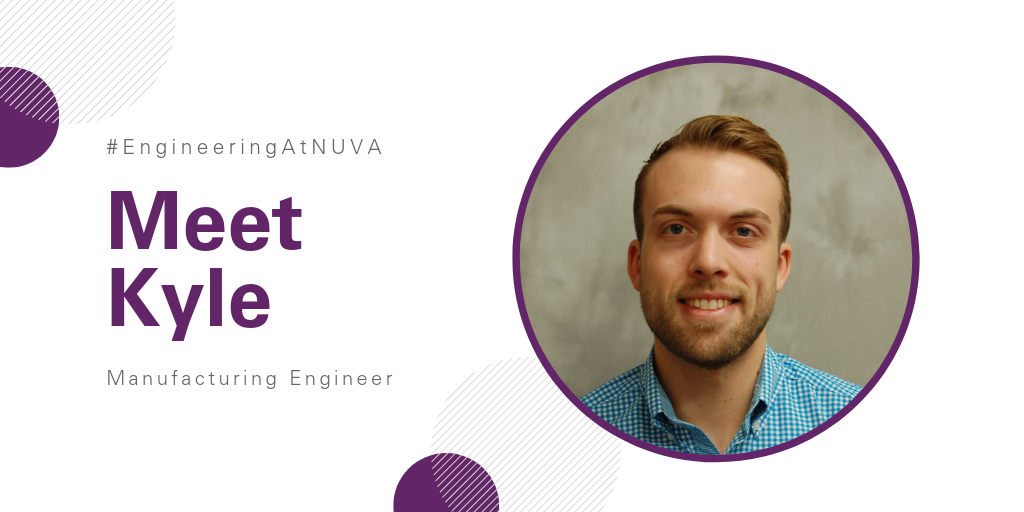
#EngineeringAtNUVA is a series that highlights talented engineers who make up NuVasive Engineering. Every feature will have a unique set of questions to give you the most diverse knowledge into Engineering at NUVA including roles within Manufacturing, Development, Software, and Electrical Engineering. The series is for students interested in the field, for prospective engineers who want to understand our culture, and for those intrigued to meet some of our incredibly intelligent Shareowners!
Our next feature for #EngineeringatNUVA is Kyle, Manufacturing Engineer in the Advance Engineering Department.
Why did you choose to work in Medical Device for Engineering versus other industries?
I chose to work in the Medical Device industry because I have been surrounded by the medical field since I was young; my mom is an oncology nurse, my aunt is a pharmacist, and another aunt was an ER nurse.
I enjoyed taking materials engineering classes in college and I wanted to combine my compassion for helping others with my knowledge of materials—so naturally I chose to work in medical technology.
How long have you been at NUVA?
I have been at NUVA since April 2018 and during this time, I’ve been a member of the insourcing/NPI team in Ohio working to implement new products and processes as a mechanical engineer. Specifically, I have been working on cleaning processes that support new product launches for the site, such as Cohere Porous PEEK and sterile packaging.
Is there a specific class or skill that you wish you took/learned prior to graduating college that would positively impact your work now?
I wish that I would have taken an ergonomics class before graduating college. This class was offered, but I missed the cut-off for enrolling. Talking with some of my classmates at the time about the class made me realize how important this topic is in the industry. Not only is it important to consider ergonomics when designing a new product to be used as a surgical instrument, it is also important to consider this aspect in manufacturing floor layout and design of fixtures for machining implants
Can you describe your path from realizing you wanted to be an engineer to present day (classes in school, internships, anything that exposed you to engineering)?
I knew I wanted to be an engineer as early as the 6th grade. As a kid, I was fascinated by how things worked. I always asked questions (to my parents’ annoyance) because I wanted to learn everything I could. At Marquette University, I was given the great opportunity of working with a local manufacturing company as a co-op in the Applications Engineering department.
The different value streams I was able to work with as a co-op, was an invaluable experience that helped me apply real-world situations to the classroom. I was able to travel and talk with customers to help solve their problems.
I later accepted a full-time role with that company and the transition from university to working as an engineer was as seamless as possible. Without these great experiences that I was fortunate to have early on in my education and professional career, I would not be the well-versed engineer that I am today.
What types of inspiration led you to the Engineering field?
My inspiration that led me to the engineering field was my parents. At a young age, my mom always taught me to be diligent and to apply my analytical skills to everything that I did. I learned these skills from my father; he taught me how to fix things when I was younger and always let me help him on projects around the house, whether it was fixing the snow-blower or finishing the basement. My father did not go to college and has worked in a technical field since right out of high school. I greatly value his work experience; without his technical skills and his patience with teaching me everything he knows, I would not be the engineer that I am today. I often tell him that he has an honorary engineering degree because of this.
For those deciding on which type of engineering path to embark on, what would be your best advice (ex: mechanical vs. bio vs. software)?
First off, I am biased to say that you should choose mechanical engineering (this is my degree). The degree includes classes from heat transfer to strength of materials. I enjoyed taking classes of many different subject areas because you never know what you might need to know in your career; learning these engineering fundamentals will help you along the way. Second, the world would not be able to sustain itself if everyone who went into engineering took the mechanical route. Third, my best advice is to choose something that you are passionate about. If you enjoy taking software classes, choose software engineering; if you enjoy taking circuits classes, choose electrical engineering; if you enjoy learning about the mechanics of the body, choose biomedical engineering. If you are not doing something that you are passionate about, then it’s not worth doing at all.
What makes Engineering unique at NuVasive in your opinion?
Engineering at NuVasive is unique in that every day, there seems to be a new opportunity to solve. Whether it’s working with maintenance on how to best install a new piece of equipment or meeting with supplier quality and regulatory affairs on how to transition new products to be made on that new machine. This challenging atmosphere is what helps make NuVasive engineering a fun and rewarding group to be a part of.
Interested in the engineering field at NuVasive? Learn about open roles and what it takes to be an engineer with NUVA by clicking here.